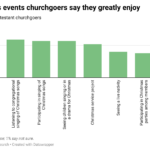
It is a challenge for churches to start new small groups, but it is some of the most significant work a church does.
By Ken Braddy
It seems hard to believe, but I have been leading group ministry in the local church since 1989. My work of supporting group ministry now continues nationally in my role as Lifeway’s director of Sunday School. Central to my more than 30-year ministry message is the challenge for churches to start new groups. Starting new groups isn’t easy, but it is some of the most significant work a church does. There are at least 10 reasons it is good for a church—any church—to start new groups.
1. New groups grow the church
For every new group a church properly starts, that church’s group ministry grows by an average of 10 people. This month, I am beginning a short-term staff position at my church where I will be my church’s director of group ministry. And the first thing I am going to do is lead the staff to start new groups. Stagnation in group ministry can often be traced to the lack of initiative in starting new groups. If your church isn’t growing, ask yourself when you last started a new group.
“If your church isn’t growing, ask yourself when you last started a new group.” — @KenBraddy Click To Tweet2. New groups cover “churn”
Every church has a percentage of people who leave the church over the course of a year—what we call churn. In most churches, the churn can be anywhere between 10-20%. Sometimes people die. On other occasions, their work schedules change hindering them from attending on Sunday morning, or they have a disagreement with someone causing them to stop attending. Before a church can experience positive growth, it must cover the churn that is bound to take place. New groups fill that void and then allow the church to move forward.
3. New groups can reach the formerly connected
It’s a fact of group life that on any given day a group meets, about 50% of the group’s members will be in attendance. Some of those missing people reappear in a few weeks, but others silently slip away and stop attending. If those chronic absentees try to reconnect with their group, their long-term absence can be awkward and often prohibitive to them rejoining the group. But when new groups are started, chronic absentees can be informed they have new options and new opportunities to start fresh with a new group, making re-entry much easier and less embarrassing for them.
4. New groups create an outward-facing culture
As churches start new groups are and celebrate them during a worship service, it sends a signal that the church desires new groups. (I’ve always believed that if something is important to the pastor, it becomes important to the church.) Regularly starting new groups keeps the focus where it should be—on people who are far from God and disconnected from Bible study and fellowship.
“Regularly starting new groups keeps the focus where it should be—on people who are far from God and disconnected from Bible study and fellowship.” — @KenBraddy Click To Tweet5. New groups make room for new leaders
New groups must have people to lead them. In adult groups in particular, group members often step into leadership roles in which they care for a portion of the group members, plan regular ministry action days, plan ongoing fellowships, lead a prayer ministry, and more. These kinds of leadership opportunities increase their commitment to the group and church, while giving people a safe place to learn how to lead.
6. New groups have a positive financial impact on the church’s giving
Every church has a per capita giving amount. This figure varies from church to church, but once it is established, it rarely varies significantly from year to year. You can figure your church’s per-capita giving by dividing weekly financial giving by the number of people in worship or Bible study groups. A $20 per-capita giving amount is considered on the low end of the spectrum. (I’ve served in churches where per-capita giving was almost $60 per person.) So, if we assume a $20 per-capita giving (just to be safe) and know that every new group a church starts will reach an average of 10 people, that’s an increase of $10,400 annually per new group. If a church’s per-capita giving is $40, then the financial impact of one new group is $20,800 annually.
Now imagine if a church started, say, four groups a year. The blessings of obeying the Great Commission become obvious. When we evangelize people and teach them to obey all that Jesus commanded, God gives us the resources to continue His kingdom work. If a church started new groups every year for the next five years, think about the cumulative financial impact of starting new groups! The Transformational Groups Research study found people who are in groups give at a higher rate than people who are not in groups.
“When we evangelize people and teach them to obey all that Jesus commanded, God gives us the resources to continue His kingdom work.” — @KenBraddy Click To Tweet7. New groups give people choices
People like choices. New groups allow people to choose a group leader and a group that best fits their needs. But don’t forget that although expanded choices are great on a Sunday morning, new groups that are started on other days and times also provide people with choices. In most communities, up to 25% of people work on Sunday mornings and cannot attend any new groups that are started at that time. To give those people choices, consider morning, evening, and mid-week groups.
8. New groups support your church’s disciple-making strategy
Your church’s groups provide foundational discipleship through their ongoing ministry. As such, it is the most highly-attended ministry of your church, besides the worship service. Since your group ministry is the second-most-attended ministry weekly, it must be infused with new life through new groups.
9. New groups prevent “the LEGO® factor”
LEGO® blocks are a popular toy for children. The LEGO® blocks connect with one another, with the largest typical blocks having eight small nobs for connecting with other blocks. When Bible study groups have been together longer than two years, they tend to turn inward because the people in the group get “LEGOed up” with other people in the group. When a new person or couple appears for Bible study, it’s often difficult for them to connect relationally with people in the group—those people already have all the connections and relationships they can handle. Not so in new groups. Like the largest LEGO® blocks, people in newer groups have open connection ports for new people.
10. New groups overcome the 80% rule
When a space (worship space or group Bible study space) reaches 80% of its capacity, growth tends to slow. Rooms begin to look overly full, even though there are still some places to sit. New groups allow guests to be channeled to them, making sure that the 80% rule isn’t in play.
These are 10 of the best reasons for your church to do the hard work of starting new groups. Discover the possibilities you have for reaching new people, find the space for them to meet, train the leaders, and go after the people. When you do this, you’ll reach new people, see new people step into group leadership, and grow the group ministry year over year.

Ken Braddy
Ken is Lifeway’s director of Sunday School. He is the author of 11 books on group ministry, including Breakthrough: Creating a New Scorecard for Group Ministry Success. He also hosts a group ministry podcast, Disciple-making in Community. Follow his group ministry blog at kenbraddy.com.












